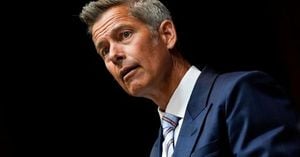Donald Trump’s return to the political spotlight as the 2024 presidential election draws nearer is sparking renewed excitement among cryptocurrency enthusiasts. His nomination of Scott Bessent, the former chief investment officer for hedge fund magnate George Soros and founder of Key Square Capital Management, for the position of Treasury Secretary, is particularly noteworthy. Bessent is recognized for his vocal support of blockchain and digital assets, marking what many believe is the onset of more favorable policies for the crypto industry.
Bessent’s nomination is viewed as a pivot away from the cautious regulatory approach taken by the Biden administration, led by current Treasury Secretary Janet Yellen. If confirmed, Bessent is expected to implement clearer regulations, potentially facilitating the integration of digital assets within mainstream financial frameworks. His history of investment and advocacy for blockchain technology showcases confidence and vision for its transformative potential.
With Trump’s history of embracing crypto, he was the first presidential candidate to accept campaign contributions in the form of digital currency. His cryptic hints at establishing a federal Bitcoin reserve cast Trump's administration as one where cryptocurrencies could flourish. This aligns with sentiments expressed by Bessent who believes, "Crypto is about freedom and the crypto economy is here to stay. Crypto is bringing in young people, people who have not participated in markets." A national reserve of Bitcoin could theoretically shore up the U.S. dollar, serving as both investment and asset management, potentially alleviating national debt issues.
The timing of Trump’s plans coincides with soaring Bitcoin prices, which recently approached $100,000, seeing gains of about 130% within the year following his November victory. Investors are optimistic about how Trump's leadership may reduce restrictions on cryptocurrencies and promote widespread adoption. During his campaign, Trump emphasized his vision for making America the "world capital for crypto and Bitcoin," which has evidently influenced market trends.
But how realistic are these ambitious plans? Speculation arises around the mechanics and potential hurdles of establishing such Bitcoin reserves. Senator Cynthia Lummis has put forth bold proposals, including the accumulation of 1 million Bitcoins over two decades, aiming for the U.S. to own 5% of the total supply. This, proponents argue, would not only benefit the dollar but could also provide substantial collateral against rising inflation.
Critics, including Ananya Kumar from the Atlantic Council, raise concerns about Bitcoin's role as a safe hedge against inflation due to its historical volatility which often sees it mirroring stock markets. Investing heavily in Bitcoin, they warn, carries the risk of adverse impacts on the economy, particularly for retail investors who may not reap the same benefits as institutional players. Kumar argues, “If the U.S. invests in a volatile asset, it risks downstream effects on the economy.”
Investors remain divided on whether Congress will support such initiatives. While betting markets suggest approximately 64% chance of establishing Bitcoin reserves before 2026, the political climate is tumultuous and often hostile toward innovation within the cryptocurrency space. Legal frameworks would still have to undergo significant evolution, requiring not just Treasury approval but Congressional consensus as well.
Assessing the impact of potential Bitcoin reserves leads to intriguing projections. Some crypto experts, like billionaire Michael Novogratz, forecast Bitcoin prices could skyrocket to $500,000 or even $1 million amid global adoption of similar policies by other nations. Bessent’s support, if successfully translated to actionable policies by Congress, could change the nature of financial reserves globally.
The debate extends to whether Bitcoin should be likened to oil and other commodities strategically reserved by nations, underscoring its significance as now entering conversations typically reserved for traditional asset management. Yet, unlike oil's immediate importance during disruptions, Bitcoin’s significance remains more abstract, leading to valid questions about its role within government frameworks.
Against this backdrop, regulatory changes initiated by Bessent, if approved, could inject much-needed clarity and confidence to the cryptocurrency market. Peer-to-peer lending initiatives and decentralized finance are areas expected to see growth under this new administration, allowing crypto to penetrate various sectors traditionally dominated by fiat currencies.
Meanwhile, the excitement within trader circles grows. The prospect of clearer regulations under Bessent raises hopes among crypto advocates who believe such frameworks could encourage wider participation from investors. Ripple CEO Brad Garlinghouse echoed this optimism on social media, asserting Bessent could be the most pro-innovation, pro-crypto Treasury Secretary seen to date.
Despite the enthusiasm, hurdles remain significant. Overhauling current legislation requires cooperation from Congress, where skepticism around Bitcoin’s role persists due to its volatility, environmental impact, and ties to illicit activities. While Bessent has expressed commitment to “smart regulation,” which would advocate for innovation without compromising stability, the outcome remains to be seen, especially with cryptocurrency regulation still being perceived as rife with potential for fraud and market manipulation.
Moving forward, mainstream investment strategies may shift significantly. If Trump's vision is realized and Bitcoin reserves are adopted, the perception and functionality of Bitcoin may become integrated. The calls for additional measures—such as converting gold certificates owned by the Federal Reserve for Bitcoin purchases—hint at the transformation of traditional reserve strategies, but such maneuvers also bring inherent inflation risk as pointed out by Kumar.
Finally, whether or not Bessent takes the helm as Secretary of the Treasury, the continuation of this pro-crypto sentiment may usher in fresh perspectives on cryptocurrency as we approach 2025. If history informs future endeavors, the Bitcoin market's reaction to the political winds of the Trump administration suggests a potential roller-coaster ride awaits, with significant opportunities for both growth and volatility looming on the horizon.



